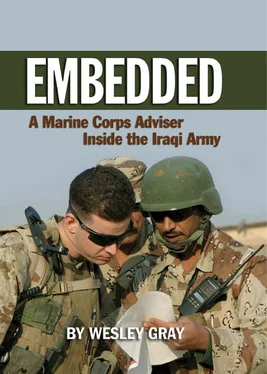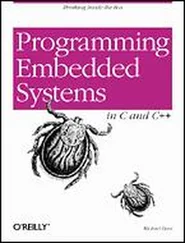After showing the new team the operations in Haditha, we returned to Camp Ali. On our arrival the boss ordered, “Gents, we’re going to turn around and do the same convoy, but we’re switching in different members from the new MiTT.” Doc sneered at me. “Sir, is he serious?” I answered, “Doc, would you expect anything less from our fearless leader?”
On our second trip to the Haditha FOB, we assumed we would field fewer questions. We had a Navy corpsman who was on his fourth combat tour and a Marine gunnery sergeant who was on his third trip to Iraq. Our assumption was false. The Navy doc acted like a puppy the entire time. First, he bitched about Staff Sergeant Haislip’s driving and told him he was “swerving and juking around on the road trying to play games.” I tried to explain to the doc that you couldn’t drive in a straight line because you have to dodge potholes and suspicious areas along the way. This explanation sailed over his head. In his mind the drive to Haditha should be like a drive down the Pacific Coast Highway in California.
The new doc’s other gripe was that we didn’t immediately turn on our Chameleons on leaving camp. I tried to explain to him that there was no radio-controlled IED threat in the area and that the insurgents don’t plant IEDs just outside the gate of Camp Ali because it is under surveillance at all times. He dismissed my answers and then threatened to kick all our asses if the next time around we didn’t turn on the Chameleons the exact second we left the wire. Doc McGinnis replied to the new doc’s threats for all of us: “Doc, quit being a pussy. You are with the Marines now. Plus, the Chameleon is not a force field that saves your life. Grow a pair of balls, dude.”
The new team was running scared. I understood being motivated when you are in a combat zone and training hard, but I also understood that this was a marathon and not a sprint. If these guys planned to survive the deployment they needed to take a “chill pill” or they wouldn’t survive the tour. I got tired just watching them.
The absurdity of the new team was exemplified on our convoy to Barwana. On the way the Iraqi water truck overheated and died along Route Phoenix. Somehow Sermen and his crew of Iraqi mechanics were able to get the thing running just long enough so that we could make it to the entry/exit checkpoint that sits on the outskirts of Barwana. With the malfunctioning water truck, we made it into the safety zone. We were relieved. If we had been stuck along Route Phoenix in hostile territory, the situation would have been much worse. The new team seemed to have a different assessment of the situation, however. They still thought we were under enemy fire. Once the Humvees stopped at the checkpoint, the new MiTT rushed from their vehicles, posted security, and searched for the enemy.
Doc McGinnis and I, still sitting in the safety of our bulletproof Humvee, looked at each other in amazement. Doc blurted out, “Sir, are these guys crazy?” I had no reasonable response. They were crazy. Here we were, in a Marine-controlled checkpoint surrounded with ten Marine amphibious assault vehicles mounted with 50-cals and MK-19 grenade launchers. What the new MiTT guys were going to accomplish by exiting the safety of their bulletproof Humvees was beyond me. I wondered if we had acted like this when we first got here. I remembered being nervous, but not stupid.
January–February 2007
Turnover to the new MiTT was officially complete. We were no longer on the hook for anything. The new team was definitely a different breed, and I hoped they would be successful. I thought they would realize over time that their overconfidence, strictness, and motivation were useless on adviser duty unless they formed relationships with their Iraqi counterparts. I knew it had taken our team at least a few months to understand that Iraqis do not take orders from Marines.
I was happy our duties were over, but I was also very sad that I was leaving the battalion. I had formed amazing friendships with the Iraqis and gone on some amazing adventures. Sure, they were selfish, lying, untrustworthy, backstabbing, begging bastards for the most part, but they were my friends. I had to survive alongside these men. They were rough around the edges, but I knew that if it came down to protecting me in a firefight, every jundi in the battalion would have taken a bullet for me (see photo 19).
We were bound by a warrior ethos, and that is something I will never forget.
Final Observations on Camp Ali
I made some observations my final day at Camp Ali. Around camp we had half-built foundations for a group of buildings that were supposed to have been erected months ago, fifteen tractor and heavy equipment machines collecting dust and at the same time costing Iraqi and American taxpayers large amounts of money, a group of Iraqi contractors sitting in their hooch watching television and sleeping all day, and an ongoing fight within the MOD and the MOE/MOW over whether or not building can continue at Camp Ali. Hordes of wasted efforts and resources because the central government could not agree on issues.
We also had a battalion that had gone from about 500 soldiers to a unit of roughly 185 with low morale, no initiative, no desire to protect the Iraqi foundations of democracy, and a strong desire to collect their paycheck.
I witnessed six different occasions on that last day in which Iraqis, both jundi and the civilian contractors, came up to MiTT Marines to beg for coats, gloves, computers, iPods, memory sticks, and food. All of this begging despite the fact that many of the Iraqis already owned many of these items. The root of their begging stems from their perception that Americans have all the money in the world because the Jews stole it from the Arabs and stashed it in American banks.
In addition, I asked one of the Sudanese engineers on camp how he was doing as he walked back from his morning shower. He replied, “Kosey” (“Good” in African Arabic dialect). I then looked around and noticed that out of the fifteen generators on camp that this guy was supposed to be maintaining, only two worked. This begs a few questions: who from the Iraqi government is overseeing these contractors? Why can’t somebody just tell these guys they aren’t cutting it and rehire someone who can get the job done? And why is the Iraqi government hiring Sudanese engineers when they have a population of unemployed Iraqi engineers?
Another observation: this afternoon Howyi, a jundi squad leader, slapped an insurgent detainee in the mouth, which caused the detainee to bleed from the lip. The MiTT Marines were then under the gun from the 2/3 lawyer. He wanted them to explain what was going on and why they allowed the incident to happen. What kind of question is this? How long is it going to take American policy makers to understand that we are never going to change Iraqis and make them Americans? Iraqis are going to get rough with their detainees and there is nothing we can do to change this until they decide it is a bad idea.
The lawyer’s next request from our MiTT Marines was to see the latest copy of the Iraqi SOP for interrogation. Is the U.S. military clueless enough to assume that the Iraqi army has a written SOP for all aspects of their operations? Are you kidding me? Iraq doesn’t even have a functioning legal system that outlines what the rules are in society (aside from the local tribal law that rules most areas). How can they create an official document on their interrogation techniques when there isn’t even a baseline body of law? I guess the “solution” we will use is the same one we always resort to: copy our documents, translate them, hand them over to the Iraqis, and tell them this is how they should do business. We can even tell them that detainees are to be given food and water, they need to be treated humanely, should never be intimidated or in fear, and should be handled with extreme care. The very idea that we can dictate any ideas—from democracy all the way down to how to do interrogation—is a grade-A example of dumbassery.
Читать дальше












